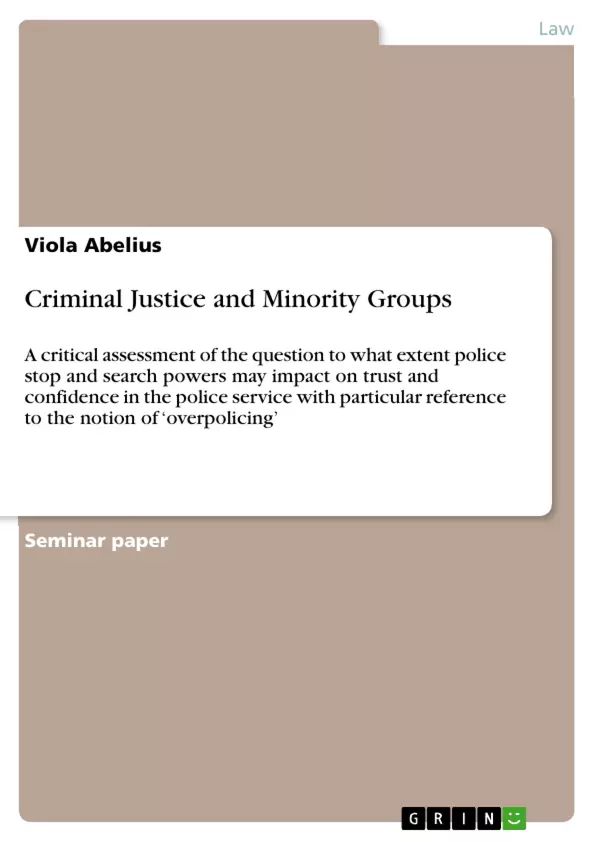The use of stop and search by the police, according to the definition on the website of the Metropolitan Police London, is an instrument to tackle crime and anti- social behaviour, and to prevent more serious crimes occurring (Metropolitan Police UK, 2009), though for many people being stopped and searched it just seems pure harassment, even racial harassment. This essay shall weigh out the pros and cons of stop and search with particular reference to ‘overpolicing’ and with regard to racism as a reason for stops and searches. Furthermore, it will analyse the impact of police stop and search powers on the public’s trust and confidence in the police service.
Inhaltsverzeichnis (Table of Contents)
- Criminal Justice and Minority Groups: A critical assessment of the question to what extent police stop and search powers may impact on trust and confidence in the police service with particular reference to the notion of 'overpolicing'
- Introduction
- Stop and Search
- Racism and Stop and Search
- The Impact of Stop and Search on Public Trust and Confidence in the Police Service
- Overpolicing and Underpolicing
- Conclusion
Zielsetzung und Themenschwerpunkte (Objectives and Key Themes)
This essay aims to critically assess the impact of police stop and search powers on trust and confidence in the police service, with particular focus on the concept of "overpolicing" and its potential connection to racial bias. The essay will examine the extent to which stop and search practices may contribute to mistrust among minority groups.
- The use of stop and search powers by the police
- Racial bias and discrimination in stop and search practices
- The impact of stop and search on public trust and confidence
- The concept of "overpolicing" and its implications
- The potential for "underpolicing" of minority groups
Zusammenfassung der Kapitel (Chapter Summaries)
- Introduction: This section introduces the topic of police stop and search powers and their potential impact on trust and confidence within the police service, particularly within minority groups. It highlights the potential for discriminatory practices and the controversial notion of "overpolicing."
- Stop and Search: This section explores the rationale behind stop and search practices, highlighting the stated objectives of crime prevention and tackling anti-social behavior. It also examines the legal framework and the criteria used by police officers in deciding to conduct stop and search operations.
- Racism and Stop and Search: This section delves into the issue of racial bias in stop and search practices, drawing attention to statistical disparities in the rates of stop and search for different ethnic groups. It explores the argument that racial profiling may contribute to the disproportionate targeting of minority groups.
- The Impact of Stop and Search on Public Trust and Confidence in the Police Service: This section examines the impact of stop and search practices on the public's trust and confidence in the police service. It analyzes how discriminatory practices and the perception of "overpolicing" can erode trust, particularly among minority groups. It highlights the importance of addressing these concerns to maintain public confidence in law enforcement.
- Overpolicing and Underpolicing: This section explores the concept of "overpolicing," highlighting the potential for police tactics to target minority groups disproportionately, leading to mistrust and alienation. It also explores the converse phenomenon of "underpolicing," where minority groups may experience delays or lack of response in their encounters with the police, further undermining their confidence in the justice system.
Schlüsselwörter (Keywords)
This essay focuses on the intersection of criminal justice, policing, and race relations. Key terms include stop and search, overpolicing, underpolicing, racial bias, trust, confidence, minority groups, ethnic disparities, and public perception. The analysis examines how these concepts interact within the context of police practices and their impact on public trust in law enforcement.
Frequently Asked Questions
What is the purpose of "Stop and Search" powers?
Police use these powers to tackle crime, prevent anti-social behavior, and stop more serious offenses from occurring by searching individuals based on reasonable suspicion.
What does "overpolicing" mean?
Overpolicing refers to the disproportionate targeting of certain communities or minority groups with police tactics, which can lead to feelings of harassment and loss of trust.
How does Stop and Search affect public trust?
Discriminatory practices or the perception of racial profiling can severely erode the confidence that minority groups have in the police service and the wider criminal justice system.
What is "underpolicing" in minority groups?
Underpolicing occurs when minority communities receive inadequate protection or slower responses from the police, further undermining their safety and trust.
Is racial bias a factor in Stop and Search?
Statistical disparities often show that ethnic minorities are stopped and searched at higher rates than white individuals, leading to debates about institutional racism and profiling.
- Citation du texte
- Viola Abelius (Auteur), 2010, Criminal Justice and Minority Groups, Munich, GRIN Verlag, https://www.grin.com/document/180889



